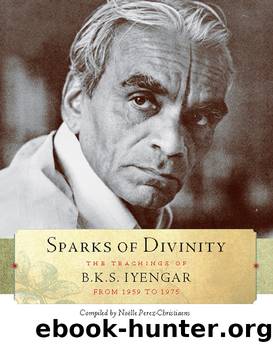Sparks of Divinity by B. K. S. Iyengar

Author:B. K. S. Iyengar
Language: eng
Format: epub
ISBN: 9781930485808
Publisher: Shambhala
IYENGAR AND NOËLLE IN PASCHIMOTTANASANA
16.55. If you know the fountain, then knowledge is there forever.
16.56. It requires tremendous concentration to let the energy flow from the feet. Then you are near the Self.
16.57. Yoga is a physiological exercise that should be converted into psychological action.
16.58. Pupils should be self-aware, not self-conscious.
16.59. When one is in a meditative state, the frontal brain is resting, and the back of the brain is acting. The awareness should flow without interruption. If there is interruption, you must charge the battery. Then the unconscious and conscious are one.
16.60. You have to create love and affection for your body.
16.61. You should know how to relax in action.
16.62. When something new and better comes without learning it, it is as quick as the dried leaves falling from the tree.
16.63. The brain is the receiving instrument. We must make the adjustment in the brain in a split second.
16.64. Self-protection is not selfishness. It is also a form of spiritual knowledge.
16.65. All parts of the body should be aware. All should be in relation to the Self. Everything should be in contact. You must look for nonduality in the posture. This can be done by keeping everything in touch with the Self. All movement begins from the Self.
16.66. If the foundation is firm, the building can withstand anything. Yoga is the foundation that allows the self to be converted into the subject.
16.67. The mind always plays a dual role between the body and the self. It wants to please the senses and the self. The mind is a bottomless pit; it is always full of desires. But if you get to the bottom, there is no more desire.
16.68. The body is the only concrete instrument on which you can concentrate. It frees the rest to become introverted and meditative.
16.69. If you have observed something, you can also feel it.
16.70. One man has done it, so you can do it.
16.71. Freedom is to be free from fear, to be desireless.
16.72. When you have learned to stretch completely, you have learned to relax completely.
16.73. We have two physical eyes, but every pore of the body is also an eye.
16.74. The receiving intellect is the meditative intellect.
16.75. Yoga is meditation: having reached the highest fragrance in one’s intellectual standard, and retaining that peak of intelligence and understanding, to keep the mind in a state of perpetual innocence.
16.76. Does one have to be a celibate to do yoga?
Yoga is practiced to keep one free from desires and still live fully. In the olden days, everyone was a householder, but they followed a certain principle: sex was a spiritual act. The license to act as you like is not freedom. A celibate is he who does not indulge in sex too often.
16.77. We begin with the physical, then we forget it. One must discipline the mind through action.
16.78. What happens when you feel pain in doing a posture?
There are two kinds of pain: physical and mental. If you have a pain that persists and intensifies as you work, it’s an indication that it’s wrong.
Download
This site does not store any files on its server. We only index and link to content provided by other sites. Please contact the content providers to delete copyright contents if any and email us, we'll remove relevant links or contents immediately.
Bodyweight Strength Training by Jay Cardiello(7185)
Tools of Titans by Timothy Ferriss(6948)
Born to Run: by Christopher McDougall(6260)
Inner Engineering: A Yogi's Guide to Joy by Sadhguru(5897)
Asking the Right Questions: A Guide to Critical Thinking by M. Neil Browne & Stuart M. Keeley(4576)
The Fat Loss Plan by Joe Wicks(4239)
Bodyweight Strength Training Anatomy by Bret Contreras(4060)
Yoga Anatomy by Kaminoff Leslie(3701)
Science and Development of Muscle Hypertrophy by Brad Schoenfeld(3578)
Dynamic Alignment Through Imagery by Eric Franklin(3489)
The Four-Pack Revolution by Chael Sonnen & Ryan Parsons(3484)
ACSM's Complete Guide to Fitness & Health by ACSM(3469)
Yoga Anatomy by Leslie Kaminoff & Amy Matthews(3396)
Bodyweight Strength Training: 12 Weeks to Build Muscle and Burn Fat by Jay Cardiello(3351)
The Ultimate Bodybuilding Cookbook by Kendall Lou Schmidt(3320)
Exercise Technique Manual for Resistance Training by National Strength & Conditioning Association(3292)
Nutrition for Sport, Exercise, and Health by Spano Marie & Kruskall Laura & Thomas D. Travis(3236)
Nutrition for Sport, Exercise, and Health by Marie Spano & Laura Kruskall & D. Travis Thomas(3232)
Yoga Therapy by Mark Stephens(3222)
